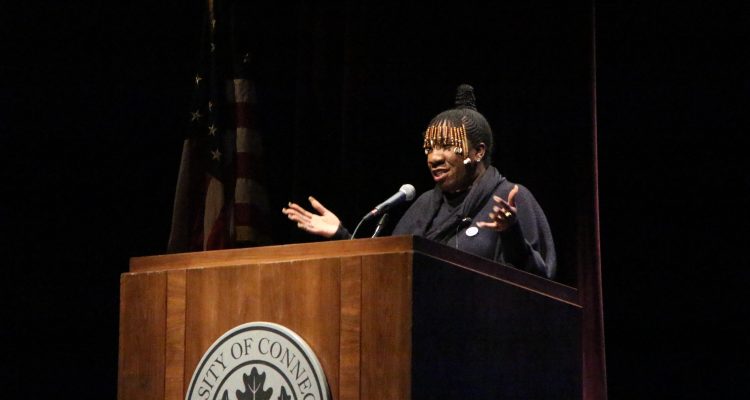On April 10, civil rights activist Tarana Burke spoke at Jorgensen about the #MeToo movement, having empathy for sexual harassment survivors, and her life as an activist.
Burke was invited to the University of Connecticut by the Women’s Center as the keynote speaker to commemorate Sexual Assault Awareness Month, which takes place in April.
Burke, 45, is best known for creating the #MeToo movement in 2006 and for appearing on the 2017 cover of TIME magazine as part of a group of activists called “The Silence Breakers”.
Since #MeToo took off on Twitter in 2017, Burke has traveled the world to participate in demonstrations and speak to universities as an advocate for sexual harassment survivors.
“I’ve been traveling around, the world really but mostly around the country, talking about #MeToo and talking about this work for about a year and a half now. And the best part about that is I get to tell people the truth,” Burke said.
The truth of the #MeToo story, according to Burke, began when she was 14 years old.
“I grew up in a family that was super conscious, if you will, socially conscious,” said Burke. “My family−my grandfather and my mother−really wrapped me in so much history and literature to make sure I was grounded in what it meant to be a black person in America. It was very important to my family. And all of this information that my family gave me as a young person made me feel smart, and it made me feel knowledgeable−and actually what it did was it give me the tools I needed to identify injustice. I knew what it looked like when I saw it, I could call it out, but it didn’t give me the tools to do anything about it.”
As a teenager, Burke joined the 21st Century Youth Leadership Movement, which she said gave her the tools she needed to enact change.
Years later, Burke created the #MeToo movement to initiate conversations about gender-based and sexual-based violence.
As a survivor of sexual abuse, Burke wanted to reach out to others who were struggling with their healing process, as she was, and let them know they were not alone.
According to Burke, real activism takes place in the community, talking with people and making marginalized voices heard.
Burke ended her talk with a call to action to UConn students. Attending her event, she warned the audience, was not enough.
“All students, you should know, solutions should be built around you,” Burke said. “You should be centered in the community-healing process on this campus, and listen to me, if you are not, if you are not happy, if you don’t think that the protections are enough, you have the power to change it.”
“The reason why 21st Century Youth Leadership Movement changed my life is because it was the first time adults said to me, ‘You have power now,’” Burke went on to say, “You don’t have to wait, you don’t have to graduate from college−you’re going to continue to learn for the rest of your life, but you have power now.”
The event was co-sponsored by the Women’s Center, the UConn College of Liberal Arts and Sciences, Women’s Gender and Sexuality Studies, the Office of Diversity and Inclusion, the Rainbow center, the African-American Cultural center, the Asian American Cultural Center, the Puerto Rican and Latin American Cultural Center, and the UConn’s Asian and Asian American Studies Institute.


